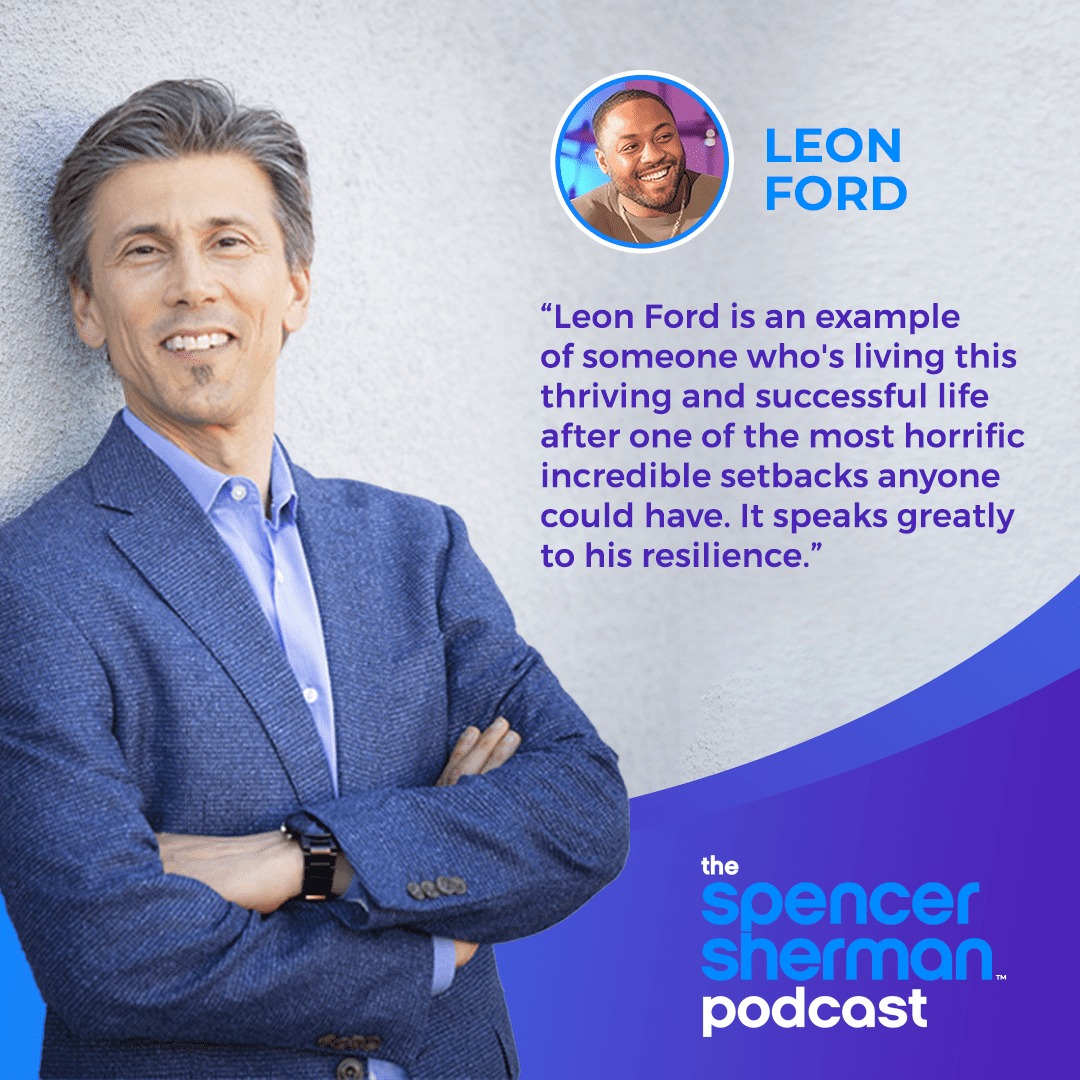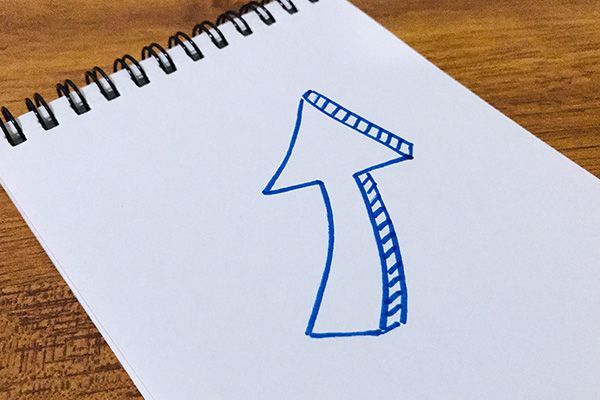
When faced with traumatic situations, it can be difficult to pick ourselves back up and continue. Leon Ford is all too familiar with this, narrating how a horrendous event that happened when he was only 19 years old almost took not just his life but that childlike mind. What was supposed to be a simple drive to his grandmother’s house ended with him being shot five times by an officer. Now, he is an activist, author, mindfulness teacher, and speaker who inspires resilience and serves his community. In this episode, he joins Spencer Sherman to share how he bounced back from that dark time in his life and offers lessons on overcoming tough situations. Leon dives deep into the childlike mind, why we lose it as adults, and the benefits to keeping it alive within us. Whether you’re experiencing financial or non-financial setbacks in life, this conversation will help you see through the challenges your way. Tap into that inner child and allow it to guide you towards finding opportunities.
---
Listen to the podcast here
Overcoming Setbacks With A Childlike Mind With Leon Ford
This show is all about training your mind for success, especially financial success. That's what we're about. I've been a financial advisor for over 30 years. What I've discovered is that the secret is in resolving the emotions and fixed beliefs that are keeping us from being more successful in our lives. We have a very special guest, Leon Ford. Leon Ford is an activist, author, mindfulness teacher, and speaker. Leon, welcome to the show.
Thank you. It's a pleasure to be connected, to call you my friend, and to be on this show with you.
It felt like a miracle when we met. We met with my son, Jeremy. You were so friendly to him. It was great for me to see the two of you interact together. I said I want to learn more about you, so I'm excited to do this. I'm interested in how you got your mind on track and how you trained your mind towards success and wellness after such a horrendous traumatic situation in your life that happened when you were 19 in 2012. If you want to give us a little bit of a sense of the before, a tiny bit of what happened, and then the aftermath about how you recovered from that. It's so helpful because all of us suffer setbacks and you suffered the biggest setback one could possibly suffer. We're all on the edge of our seats wanting to hear.
I will start by saying that my life and my mind were already on track. As a kid, I grew up in a loving household. I have a beautiful family. They're very supportive. I've always been told how amazing I was and how my smile was lighting up a room. I had nicknames like “Professor” because I would always talk to adults and they thought I was an old man. They said I had an old soul.
I had many different lovely experiences, like traveling to visit my grandfather and going to Disney World. I'm doing a lot of those things. My mind was free to be creative, innovative, and adventurous. That lasted even through my teenage years when I worked on music. I would record videos. I taught myself how to engineer music, make beats, do photography, and all these different things.

You were headed towards some good things in your life. Your life was thriving. It's what I'm hearing in a lot of ways, even before this traumatic event.
I had traumatic events before getting shot. When I was 10 years old, my best friend who was 13 was shot and killed. When I was 13 years old, my 10-year-old sister was hit by a truck and she was killed. My family was devastated, but I was still ambitious and trying to navigate through my teenage years. That leads up to when I was nineteen, trying to figure out life.
I had enrolled in school to get my CDLs to drive trucks because one of my older brothers drove trucks. I was thinking about becoming a carpenter because one of my brothers was a carpenter. I was also boxing, doing music, and a whole bunch of other things. My life could have gone in any direction. One day, driving from my house to my grandmother's house, I was pulled over by a few Pittsburgh police officers.
I provided my driver's license, registration, and car insurance, but they said that I was lying and they said that I was Lamont Ford and not Leon Ford. Even though they had my identification, they insisted that I was another person. Ultimately, I end up being shot five times by one of those officers who thought I had a gun. I did not have a weapon or anything, and I end up paralyzed. That caused me a lot of anger, frustration, and confusion. I almost lost that childlike mind that I had that my family nurtured that was so important to me.
Before we get to that childlike mind, just that you survive that incident is a miracle in itself. It speaks to your resilience that somehow you were able to survive getting shot five times. It's incredible, Leon. Everything you shared about your family and your upbringing must have enabled you to survive that incident.
That's part of where my joy comes from because unfortunately, there are a lot of people who have been murdered during these police shootings. I survived, and I don't take that lightly. Even though I use a wheelchair, I'm extremely grateful to be able to live my life the way I do.
Let's get to this childlike mind because that's a juicy place for us to explore together. When we chatted another time, you were able to clearly articulate the wonders of having a childlike mind. Whether you're 5, 50, 30, or 80 years old, that childlike mind is what creates new business opportunities. It's able to see things in positive ways. There are so many benefits to a childlike mind that I know of and I want to hear from you. Tell us what you mean when you say that you were afraid of losing this childlike mind, how you kept it, and how that has helped you not just recover, but begin to thrive after that event.

First, let me describe what I mean about a childlike mind. A childlike mind is adventurous. You could tell a child no a thousand times. If they really want to do something, they're going to be persistent, they're going to try their best, and they're also going to be fully present. Children are very present in whatever they're doing. If they're playing with Legos, they're giving it 1,000%. If they're playing with toy trucks or Barbie dolls, they're giving it 1,000%.
They're also being creative. They're envisioning this truck being a real truck. They're envisioning this doll talking and it's their friend. They're visionaries. They could build whatever they want. They're happy, they do it with a level of joy, commitment, and love. As adults, life conditions us to lose that joy and love, to be so serious, and to hold onto our ideas.
Children want to collaborate. They want to play with other children, and they're sharing toys and ideas. As adults, we're like, “I don't want anybody to steal my ideas.” There's a level of fear in adulthood. Some of it is justified by different experiences. Being shot was almost an experience that took that away from me. Why? It's because I began to have a distrust for White people. I began to have a distrust for police officers. I began to look at the world and think of the world as a bad place that wanted to harm me. I stopped being creative because my creativity was overtaken by anger, frustration, and confusion.
It was a long process, but one thing that helped me was my son. I was shot on November 11th, 2012, and my son was born on January 1st, 2013. He was born in the same hospital I was recovering. As you can imagine, I had to get rolled down to the 4th floor from the 7th floor, so I took the elevator. I was able to be in a room and experience my son being born.
As I was going through my rehabilitation over those few years, I would watch my son, his evolution, and his creativity grow. He was so inquisitive. He wanted to play with these toys. I was reminded of when I was a child. I would do the same thing. I wanted to get back to that childlike mind and experience the world.
This is so beautiful that he brought out in you. He triggered in the best of ways. He brought forth and activated in you this childlike mind that you always had which was robbed and taken from you with this incident. It sounds like he helped you get back to this place where you could get back to that adventurous, persistent, fully present, creative, joyous, loving, collaborative, and no-fear place.
Those are incredible ingredients for a thriving successful life. Each of those words is so dense. The word persistent means that you keep going. You don't let them get in your way. You keep going for it. Being fully present means that you're with people and you're listening to people. These are such powerful terms that you're using.
The joy, love, and collaboration that you spoke about, that we as children do so naturally, becomes more stilted when we're grownups. You hit the nail on the head when you said that we take on all this fear. It sounds like your son helped you let go of the fear and get right back. Maybe you had no choice. You had to meet him. You had to go right back to that person that you were that you had to leave.
Also, I began to read different books and listen to different types of podcasts that fed my mind. One of my favorite quotes comes from James Allen. He wrote the book, As a Man Thinketh. It reads, “A man's mind may be likened to a garden, which may be intelligently cultivated or allowed to run wild; but whether cultivated or neglected, it must, and will, bring forth. If no useful seeds are put into it, then an abundance of useless weed seeds will fall therein, and will continue to produce their kind.”
If you let your mind go without keeping positive people around you, without practicing mindfulness, and without being optimistic and hopeful, then it will run wild. You'll let that fear cultivate itself within your mind and spirit, and then you'll live a life of fear, which is not a good quality of life. It's important to pour love into your mind and spirit. It's important to remember, “Who was I as a child? What would my ten-year-old self want to do in life right now?”
If you let your mind go without keeping positive people around you, without practicing mindfulness, and without being optimistic and hopeful, it will run wild.
I'm sure a lot of people tuning in to this show are experiencing some setbacks in their life. Often, it could be a financial setback with their job, business, investments, or something that is not going well. They can't buy a house. There are all kinds of challenges people are having financially and in all other ways. What might be some of the things that you would suggest to this person?
I would suggest they acknowledge their emotions fully. Whatever you're feeling, feel it fully. When you suppress what you're feeling, it's going to show up. It's going to seep out of you, and you're not going to be able to control it. As much as you think you're controlling it, it might show up in your relationship with your children, your spouse, or at your job.
Whatever you're feeling, feel it fully. When you suppress what you're feeling, it's going to seep out of you, and you're not going to be able to control it.
Any easy way to do that? Some people say, “I can't feel. I don't know how to feel it. What does that mean to feel it fully?” Any little tricks you recommend on how to do that?
You can inquire to yourself, “How am I feeling? Am I angry? Am I frustrated? Am I hurt? Do I feel neglected? Do I feel abandoned?” Figure out and inquire about, “How am I feeling?” Check your pulse, and then feel it. Give yourself permission to feel what you're feeling, and then, you can move forward. It's like a child. My son fell and hurt his knee. He cried so hard for about three minutes. Once he let it all out, he began playing again and he forgot even about the knee. It was cool. We got to let it out completely, and then move forward.
You started saying about asking the younger version of you when you were ten years old or something, what that person would say or do. Can you say more about that?
When we are children, we have these ideas for how we want to live our lives and we have some things that we love to do. Some people may be in the financial world. They may love to draw. However, because of their workload, they may not have been able to draw for fifteen years. When was the last time you drew? When was the last time you danced?
When was the last time you went hiking? When was the last time you dove in a pool and swam? When was the last time you listened to your favorite song? These are some things that you can do, so you can get back to balance that work-life balance. Also, to remind yourself of that inner child that was a dreamer and that was very innovative in problem-solving. You were so good at problem-solving because you didn't take things so seriously.
You can even directly ask the child. Maybe the child will even whisper to you some wisdom.
You would be amazed at what we could learn from children, especially as we reconnect with our inner child.
Tell us anything else that you would share with someone who's having a setback in their life, financial or non-financial. You say, “Feel it fully. Get into your younger child. Maybe talk to that younger child. Get some advice from that younger child.” What else would you recommend?
I would go back to what I shared during our previous conversation, the wisdom my grandfather gave me. I was depressed. I was down and angry. I was in a lot of pain physically, mentally, emotionally, and even spiritually. I was questioning God every day. My grandfather called me, and he says, “Leon, you're experiencing the worst moment of your life. This is the lowest you would get. However, I want to let you know that you cannot fall off of the floor.” It stuck with me because if you get on the floor, you can't fall off the floor. He told me, “You got to get up and you have to get yourself up off the floor. How high you want to climb is up to you.”
For anyone who's tuning in who feels like they're hit a low point, you can't get any lower than being on the floor.
Also, back to the childlike mind piece, there's a quote by Paulo Coelho. He's one of my favorite authors. He wrote The Alchemist. He says, “A child can teach an adult three things. 1) To be happy for no reason. 2) To always be busy with something. 3) To know how to demand with all his or her might which he or she desires.”
A lot of us have a hard time asking for what we want in life. I love that last one.
You have to demand it, not just ask for it. You have to demand it because it's yours. You have to make that commitment to yourself as you're on the floor or wherever you are. If you fall on the floor, you have to demand that, “I'm going to get up. I'm not going to give up. I'm going to live the life that I deserve.”
Any advice you'd have for someone who's going for a job interview, very scared they're not going to get the job? What would you say about that?
Just show up. Bring yourself. Show up fully because you can't go into these spaces with fear. You’ve got to let the fear go, all the negative thoughts, and the things that you're carrying. Let it go and show up fully. That's my advice. I have a pledge that I share whenever I speak. I'll share it with you here. It goes, “We must give up to go up. We must give up to grow up. We must give up on the way up and give up, even more, to stay up. I cannot teach what I do not know. I cannot lead where I will not go. I am because we are. We are because I am. I am my brother's keeper. I am my sister's keeper. I am destined for greatness because I attract what I am.”

That is profound. Leon, can you share a little bit about what that means to you and what that quote had done for you?
That is my pulse. Giving up to go up. I have to give up all the negativity, anger, and frustration because life is going to happen. We talk about the four noble truths. Life is suffering, and then there's the path to suffering. Well-being is the end of suffering, and then there's a path to the end of suffering. I'm on an eightfold path, living my life the right way.
I'm trying to have positive thoughts. I'm trying to be my brother's keeper and my sister's keeper. I'm trying to lead people in a positive way. I cannot lead where I will not go. I cannot teach what I do not know. I'm teaching the wisdom that I've learned and that I've acquired through life. Whether I've acquired this wisdom directly from my lived experience, or indirectly from experiences of friends, relatives, and inspirational people that I've come across through readings or teachings. That's what that pledge means to me, and I say it every day.
How do you define success for yourself?
I had a moment when I realized I was successful. I talk to my parents and my grandparents every day. I was on the call with my grandfather, and he was so proud of me. I talked to my grandma. She was proud. I talked to my parents. They were proud. I talked to my son, and my son said, “Dad, I have a project in school where I have to choose a leader, and I have to be that leader for the whole day, and I chose you. I'm going to talk about writing books, being positive, spreading love, being a speaker, training police officers, and traveling.”
It was at that moment that I realized that I was successful. I describe success as making a difference and inspiring people around me to do their best through the ripple effects of that love and collaboration. Me meeting you in Menla, us having a connection, and now doing this show with you is a success. It's in alignment with my values. I have what I call the four Ps. Everything that I do to measure success has to be in alignment with the four Ps.
Success is about making a difference and inspiring people around you to do their best through the ripple effects of that love and collaboration.
The first P is, “Is it Positive?” Everything that I do has to be positive. The second P is, “Is it Purposeful?” This is in alignment with my spiritual purpose. The third P, “Is it Productive? What am I producing?” Right now, we're producing an interview. The fourth P is Profit, “What am I gaining in exchange for my time?” I use those four Ps to govern me and to measure success.
I assume that the word profit is in a larger sense than money.
It's much larger than money. It is, “What am I gaining in exchange for my time?” I didn't make money when I went to Menla, but I met Spencer, and now we're doing an interview. I gained a friend, and my friend is sharing his platform with me. I have no idea who's going to read this or what other friends I'm going to acquire from being connected to you. That's a profit.
When I think about who's going to read it, I have compassion for those who don't read it. I hope those are very few people who don't listen to you speaking. This is so beautiful. I'm with Leon Ford. He's an incredible activist, meditation teacher, and speaker. He's an example of someone who's living this thriving successful life after one of the most horrific incredible setbacks anyone could have.
In the final minutes here, you can share what you do. When you come upon a day where you're just, and maybe you go back to the four Ps or that pledge. I'm wondering, what's your go-to when you're feeling like, “Do I have to do this?” When you're off-court or when you wake up one morning and you're not in that vibrant positive place, what do you do?
The first thing that I'd do is give myself grace. I tell myself that it is okay not to be having a good day. People often label me as, “You're always positive. You're always smiling.” For those out there who do have those types of personalities, sometimes we feel like we're not allowed to have an off day. The first thing I do is say, “It's okay. I'm giving myself permission to have an off day.”
The second thing I do is check my pulse. How am I feeling and why am I feeling that way? Sometimes I'm able to identify it. Sometimes not. If I'm able to identify it, I'll confront the issue and figure out a resolution. If I'm not able to identify why I am off that day, I'll think about something that's going to make me feel good. I'll turn on some music that inspires me. I'll watch a motivational video. I'll watch a good movie. I may pick up a good book. I may go and go roll around at the reservoir. I may go sit in nature. I love classic cars and I collect them, so sometimes I'll go to my car garage and start up one of my classics and just listen to the engine, or drive one of my classics if it's not 10 below 0 in Pittsburgh.
I'll feed my inner child. Sometimes I'll play with my son, take him to the park, and run around because children are inspirational with how they handle life and how they dream. I dream and connect with a network of positive people that I can call to share and release to. I also go to therapy. I used to go once a week. Now, it's about once every other week. It's a part of my self-care routine.
I'm so glad you mentioned all of this, including the therapy piece, Leon, because like you said, there's a shame, especially for a person who appears happy a lot. There's this expectation that you have to be on all the time, and that's not true for any of us. It's so good for all of us to learn this about you. Despite all of your success and joy that's clearly radiating from you whenever I've been talking with you and certainly when I've been with you, there's this radiance of joy that you two have to do your own inner work. It's not automatic. You have your setbacks and you do all these practices including therapy to keep yourself on your path. There's a fifth P for you, Leon. The last question I'm going to ask you is, what's your vision for what's possible for you and for human beings?
My vision for what is possible is a collaboration that's rooted in love and respect. Why I say collaboration rooted in love and respect is because I don't think we necessarily have to agree on everything. We're moving to a society where if you have a different thought or opinion, you get canceled out. I like to honor people's thoughts and opinions, but there has to be a sense of an honor system where we respect each other. We have compassion for one another. We have understanding, and we can collaborate despite our differences.
There are so many differences in the world within each of us. There are parts of me that sometimes feel in conflict with each other. Certainly, on this larger scale, there are conflicts within every family, every country, and in the United States. There is much room for improvement around collaboration with respect. I feel the transformational potential of collaboration with respect would move us in a very forwarding positive direction. Leon Ford, you're amazing. It's been so wonderful, uplifting, and transformative to be with you. How do people reach you if they want to connect with you?
My email is Leon@LeonFordSpeaks. You can also reach me on Instagram or Twitter, @LeonFordSpeaks.
Thank you so much, Leon. We're all about training our minds and hearts for success. Thank you so much for joining us, everybody.
Important Links
- Leon Ford
- As a Man Thinketh
- The Alchemist
- Menla
- Leon@LeonFordSpeaks
- Instagram - @LeonFordSpeaks
- @LeonFordSpeaks on Twitter
SHARE THIS POST
The road to financial freedom is easier when you share the journey. By signing up for Spencer’s newsletter, you’re joining a growing community of people who’ve found their way to “Enough.”





